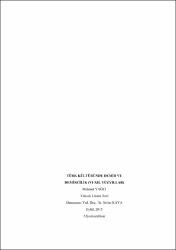| dc.contributor.author | Yağcı, Mehmet | |
| dc.date.accessioned | 2018-11-27T10:46:28Z | |
| dc.date.available | 2018-11-27T10:46:28Z | |
| dc.date.issued | 2015 | |
| dc.date.submitted | 2015 | |
| dc.identifier.uri | http://hdl.handle.net/11630/4962 | |
| dc.description.abstract | Demircilik, Türk tarih ve kültüründe sade bir ekonomik uğraş olmanın çok ötesindedir. Demiri ilk kez işleyip ona şekil vererek Demir Çağı’nı başlatan millet olan Türkler için demircilik adeta bir töredir. Türkler demirden aldıkları kuvvet ile cihan hâkimiyeti ülkülerini gerçekleştirdikleri için ona olağanüstü değer atfetmişlerdir. Dolayısıyla demir eski Türk dinine sirayet etmiş, dini törenlerin vazgeçilmez bir unsuru olmuştur. Ayrıca çeşitli Türk geleneklerinde de demir ile ilgili uygulamalar görülmüştür. Türkler demir üzerine ant içmiş, yeminlerinde üst bir kuvvet olarak onu şahit tutmuşlardır. Ergenekon Destanı başta olmak üzere birçok destanda da Türklerin demirciliği ile ilgili bilgiler karşımıza çıkmaktadır. Türklerin demir işçiliğiyle ortaya koyduğu sanat eserleri hâlen sanat tarihçilerini büyülemektedir. Bütün bu özellikleri sebebiyle demir, Türk isimlerinde, unvanlarında, atasözleri ve deyimlerinde en çok kullanılan unsurlardan biri olarak dikkat çekmektedir. Bütün bu manevi değerinin yanı sıra demir Türk ekonomisi için çok önemli bir gelir kaynağı olmuştur. Dünyanın en önemli demir tüccarlarından olan Türkler, Çin’den Roma’ya kadar uzanan geniş topraklarda demir ticareti yapmış, vergilerini demir ile ödemiş, demir ile tahsil etmişlerdir. | en_US |
| dc.description.abstract | Blacksmithing, is far from being simply an economic deal in Turkish history and culture. Blacksmithing is almost a tradition for the Turks, who process iron for the first time, giving it a form and started the Iron Age. Turks are gave the iron an exceptional value, because they achieved their ideals of world domination by the force of iron. Therefore, iron has spread to the old Turkish religion and it has become an indispensable element of religious ceremonies. Also, variety of applications related to iron in Turkish traditions has been seen. Turks have sworn on iron, they saw it as a superior force to kept their swore. Blacksmithing of Turk’s is stated in many epic, especially Ergenekon Epic. Turkish art of ironwork that still fascinates the art historian. Because of all these features of iron, it is drawing attention as one of the most used elements for the Turks, in their names, proverbs and expressions. Addition to all these moral values, iron has become a very important source of revenue for the Turkish economy. The Turks, one of the world's most important iron merchants, made the iron trade vast lands extending from China to Rome, paid and collected their taxes with iron. | en_US |
| dc.language.iso | tur | en_US |
| dc.publisher | Afyon Kocatepe Üniversitesi, Sosyal Bilimler Enstitüsü | en_US |
| dc.rights | info:eu-repo/semantics/openAccess | en_US |
| dc.subject | Türk Kültürü | en_US |
| dc.subject | Demir | en_US |
| dc.subject | Demircilik | en_US |
| dc.subject | Demir Çağı | en_US |
| dc.subject | Şamanizm | |
| dc.title | Türk kültüründe demir ve demircilik (VI - XII. Yüzyıllar) | en_US |
| dc.title.alternative | Iron and blacksmithing in Turkish culture (VII-XII. Centurıes) | en_US |
| dc.type | masterThesis | en_US |
| dc.department | Afyon Kocatepe Üniversitesi, Sosyal Bilimler Enstitüsü | en_US |
| dc.relation.publicationcategory | Tez | en_US |



















